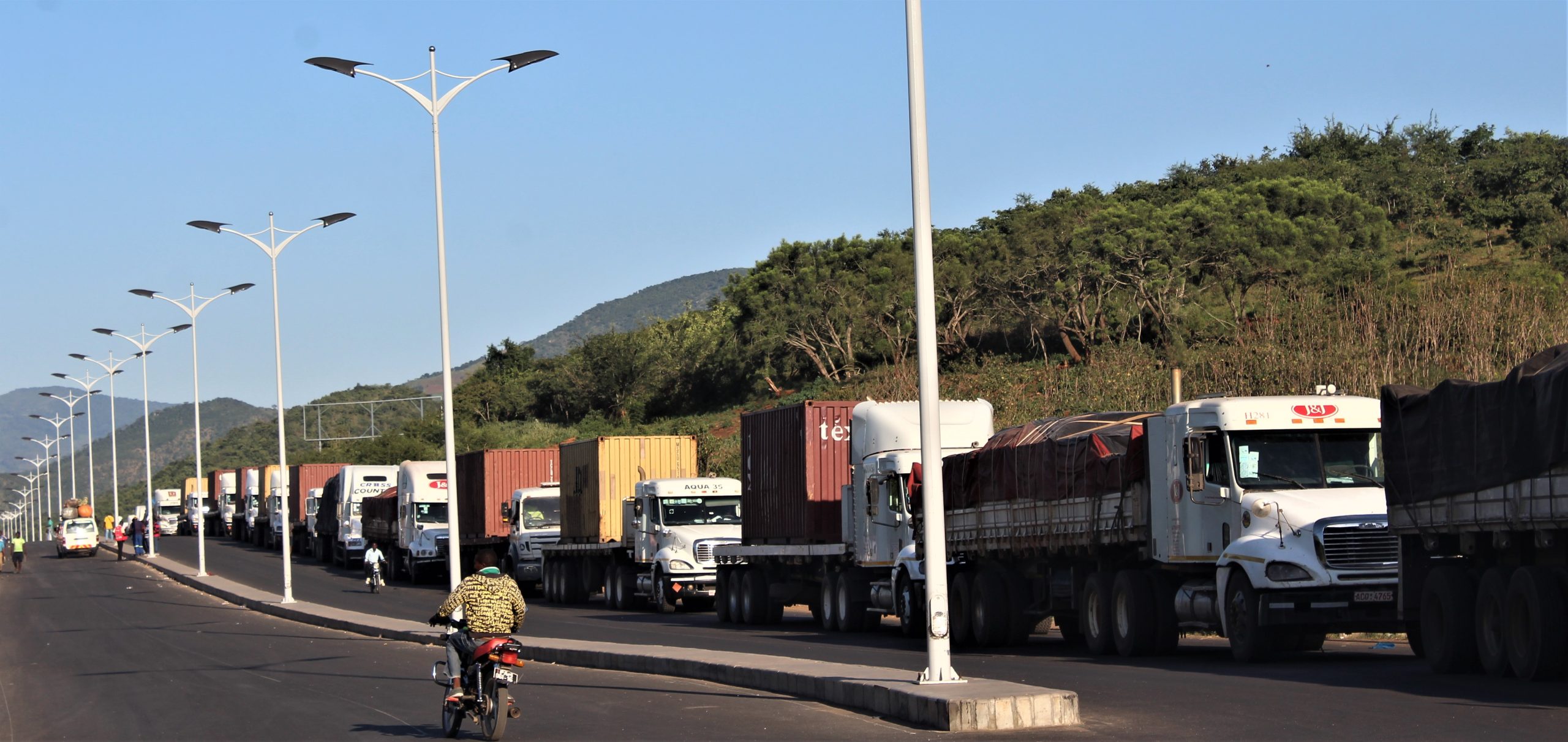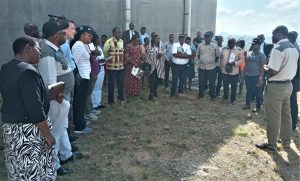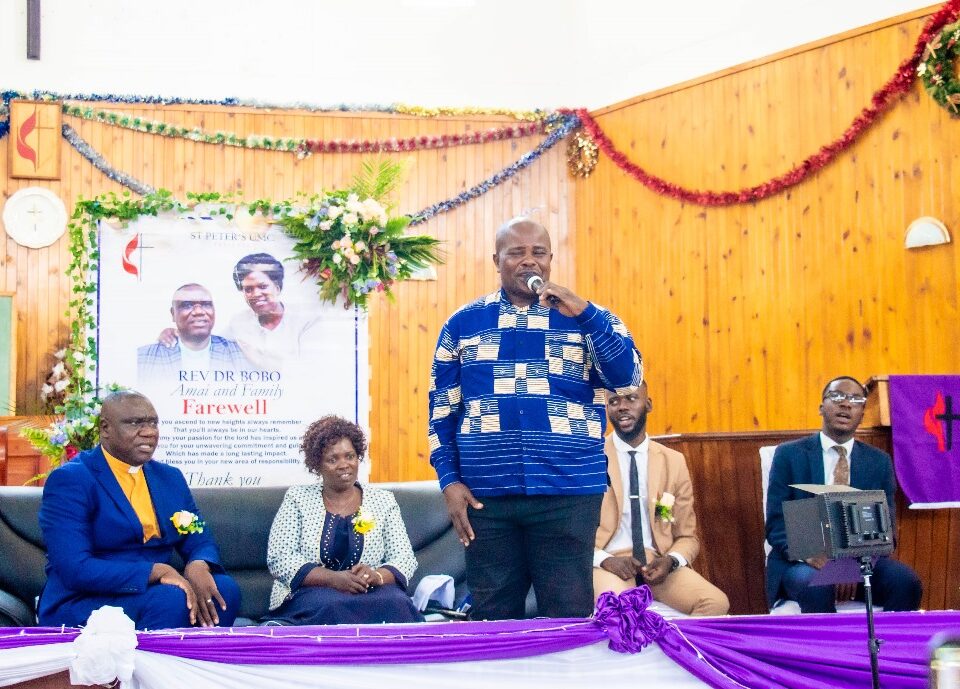
International haulage trucks road levy expected to be operational in July: City of Mutare
June 26, 2020
Eastern Highlands hoteliers, tourism operators gear up post Covid-19 recovery plans
July 3, 2020City of Mutare clarifies new tariffs, water woes fallacies

Part of the water pipes at a warehouse in South Africa, which the City of Mutare is waiting for to complete the long overdue Dangamvura water pipe project.
…We actually charge the lowest water tariffs in Zimbabwe: Maligwa
Ngoni Dapira
CITY of Mutare has the cheapest water tariffs in the country even after the recently approved increments, says the municipality’s chief administrator.

AfDB executives and partners during a tour of water works they are funding in Mutare. The tour was held in February.
During a press conference held early this month, quizzed on the state of revenue collections, City of Mutare town clerk Joshua Maligwa said the local authority is currently unable to make ends meet on service delivery because of the existing low water tariffs. In March the Minister of Local Government, Public Works and National Housing, July Moyo, approved the 2020 budget proposal submitted by the City of Mutare. This was regardless of the proposal having been condemned by residents, after being arbitrarily enforced in the 2019 supplementary budget.
“We are failing to meet part of our water obligations in terms of improving and upgrading the water infrastructure in the city because of the low tariffs that we were charging. In simplified terms, if we were charging $0.24 cents for five drums of water (1000litres), but in contradiction, people buy 500ml of bottled water in a supermarket for about $18. So a business case projection shows that we are running a serious financial deficit as a local authority,” said Maligwa.
City of Mutare finance director Blessing Kapuya said before the new water tariffs the first band of water usage from one cubic litres to 10 cubic litres was selling at 24cents per megalitre, which is 1000 litres. Kapuya added that beyond the first band of 10 cubic litres usage, the band price changes.
The new water tariff has increased water in the first band to $2, 40 for per megalitre. The finance director added that their operational costs were going up daily, so they have to be practical on revenue collections to ensure sustainable water distribution in the city. “In terms of water tariff increases. The tariffs implemented towards end of March were supposed to have been implemented in January, but the 2020 budget proposal tariffs were only approved in March. The increments however vary,” said Kapuya.
The major proposals approved in the 2020 budget were the 800 percent tariff increment on all commercial, industrial and institutional areas, 500 percent increment on all billiables outside local government authorities, all land debtors outstanding balances were increased by 500 percent for all serviced areas, health fees were increased by 200 percent, parking and clamping fees were also increased.
“We are still the lowest in Zimbabwe, but our tariffs in Mutare are unsustainable given our current inflationary environment where prices of essential goods are going up unreasonably,” said Maligwa.
Mutare was not the only city that hiked tariffs. A snap survey by Easterntimeszim revealed that indeed Mutare has the cheapest tariffs compared to other cities. Last month Gweru residents went up in arms with their city fathers after water bills went up by more than 500 percent. In Bulawayo the municipality’s 2020 budget was also approved with effect from February 1 and the local authority increased tariffs and other service charges by more than 400 percent. In Harare water charges for households also increased by 400 percent and were backdated to January.
In Harare for high density suburbs, the first five cubic metres of water now cost $20 a cubic metre up from $5. Charges are higher in low-density suburbs where the first five cubic metres are now $25 a cubic metre, the next five cubic metres will cost $29 a cubic metre, the next 10 cubic metres $33 a cubic metre and everything above 20 cubic metres will cost $41 a cubic metre.
Kapuya further revealed that the covid-19 pandemic had greatly affected their revenue flows. The local authority had been collecting $18 million (RTGS) on average each month before the lockdown regulations, which were imposed on March 30. Under the lockdown measures in April they collected $5.8 million. He said they were still to reconcile figures for May, but he had already seen a slight improvement which was however not up to the expected sum.
To show how the hyper inflationary environment in the country is fast eroding annual budgets, in April last year the local authority was collecting around US$2.3 million every month but it now collects $18 million (RTGS). Although this can be also accredited to the improvements made in the billing system, the sharp increase within a year also indicates the soaring levels of inflation and the upshot of devaluing the local currency after eradicating the multi-currency system in June last year. Inflation has surged to 786 percent, and the local currency has crashed.
“Before the lockdown our projection was to collect revenue of around $30 million after tariff increases but under lockdown our revenue collections have gone down to $5.8 million, so we have a deficit of about $25 million per month lost as a result of covid-19,” said the finance director.
Maligwa added that even their expenditures have overblown citing the new charges by the Zimbabwe National Water Authority (Zinwa) and suppliers of water purification chemicals. He said last month (May) they were paying Zinwa $428 000 per month for raw water abstracted from Odzani and Small Bridge dams, but Zinwa has since increased its levy to $600 000 with effect from this month (June).
“This is exclusive of Pungwe levies, so merged, the levy of raw water abstracted will go up to about $1.2 million this month and this is before the purification process at the treatment facility. When it’s raining we need more water chemicals but on average the water purification chemicals as of April to May, we were paying around $4 million,” said Maligwa.
In February a team of African Development Bank (AfDB) and Zimbabwe Multi-Donor Trust Fund (ZimFund) executives came to Mutare to check on progress on the Urgent Water Supply and Sanitation Rehabilitation Project (UWSSRP) in Mutare. The local authority partnered with the AfDB to upgrade Dangamvura’s water pipeline problem. AfDB is providing the resources then the local authority will provide the technical expertise and manpower to complete the long overdue project.
The completion of the 10km water pipeline which is said to be left with about 2km to be complete is expected bring relief for the Dangamvura residents. Dangamvura has a population of over 100 000 people and an excess of 15 000 residential stands, but has been receiving unreliable water supplies for over 15 years after the project was shelved. Some years back, the municipality lost US$330 000 to a bogus Harare company that had been contracted to supply water piping materials. The botched deal involved some councilors and senior managers who were accused of corruptly awarding the tender to an undeserving company without undertaking due diligence.
Apart from the Dangamvura water pipeline, the AfDB is also bankrolling the Hobhouse water reservoir and the Gimboki sewerage works.
During the tour, AfDB director for Southern Africa Dr Judith Kateera encouraged the local authority to engage citizens more and explain to them the reason behind tariff increases to ensure the sustainability of water works projects.
“Citizen participation and engagement is very important for their support on key projects such as these. This is what you need to ensure sustainability of these water projects,” said Dr Kateera.
That was after Maligwa had told the delegation about the low water tariffs they were charging which still faced a lot of resistance from residents given the high challenges of non-payment of water bills. During the presser Maligwa however said his administration is mostly suffering from legacy issues which habour feelings of mistrust, but hopes to soon break the barriers.
“All we want is sustainability, we need to do away with the syndrome of borrowing money each time we want to undertake community projects. Our systems should be self-sustainable. Council must be able to fund its own projects,” said the town clerk.
Last week Friday Mutare Mayor Councilor Blessing Tandi said the manufacturing of the Dangamvura water pipes by a South African Company which was awarded the tender by AfDB has long been completed and the materials are ready for transportation.
“Had it not been for the coronavirus global pandemic which also enforced lockdown measures in South Africa, the material was supposed to have arrived in Zimbabwe end of April 2020, but the plan was disrupted. The transportation of the GRP, AC and steel pipes have been affected by the lockdown in South Africa and we anticipate the movement of the materials once South Africa further relaxes its covid-19 lockdown measures.
“Council is ready to execute the task and retire the perennial water problems in Dangamvura by end of this year. Council is upgrading the Dangamvura water infrastructure from 250 to 450mm and that alone will improve the conveyance capacity and ensure improved running tape water supply,” he said.


